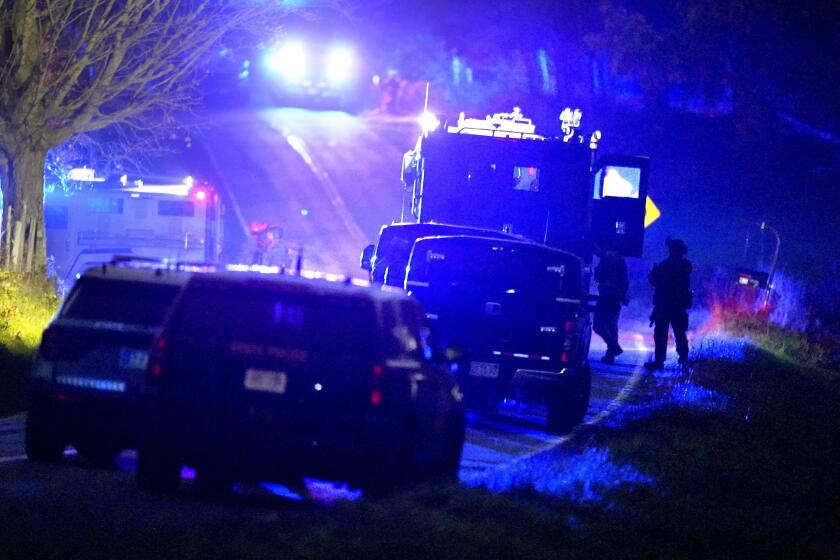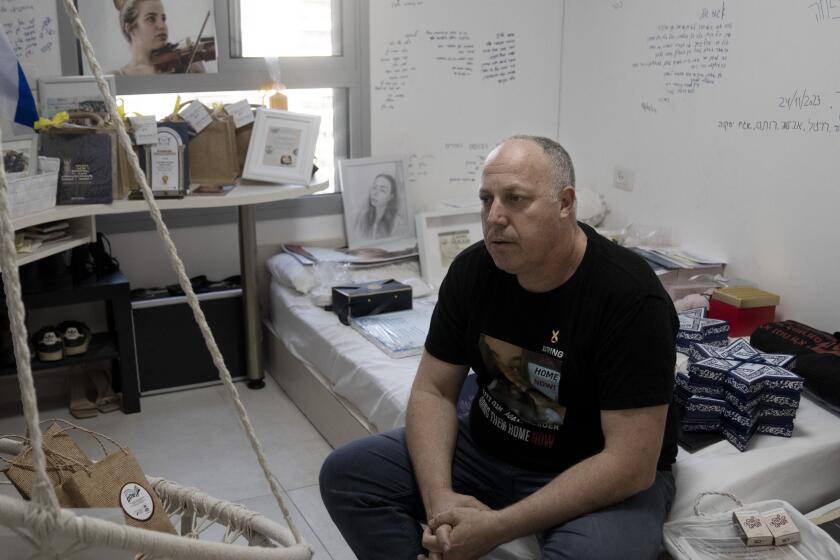Jerusalem Park Plan Imperils Arab Homes
In a valley beneath the towering walls of Jerusalem’s Old City, a Palestinian named Hashem Jalajel sat in the shade of a fig tree, holding in his age-palsied hands a document that he feared could herald the destruction of his family home of generations’ standing.
“I can’t read it,” the 76-year-old patriarch said apologetically, passing the Hebrew-language notice to one of his grandsons to read aloud. “But I’ve memorized everything it says.”
Like dozens of other homeowners in this cave-pocked valley that is now a jammed and jostling Palestinian neighborhood, Jalajel has received an eviction order from the municipality of Jerusalem, designating one of the homes in his family compound as an illegal structure that is to be destroyed.
In all, 88 homes in the Silwan district of traditionally Arab East Jerusalem are marked for demolition to make way for what municipal authorities say will be an archeological park devoted to Jewish history and sites associated with the biblical King David.
The battle over this slice of Silwan is emblematic of a larger fight for control of Jerusalem, which lies at the heart of the Israeli-Palestinian conflict. Both sides declare the city their capital, and neither is willing to renounce its claim.
About two-thirds of Jerusalem’s 700,000 residents are Jews; the rest are Palestinians.
As Israel prepares to carry out a U.S.-backed plan to withdraw this summer from the Gaza Strip, Palestinians insist that Prime Minister Ariel Sharon is using the pullout as cover for a concerted campaign to drive them from Jerusalem -- by expanding West Bank settlements close to the city, by routing Israel’s separation barrier to choke off Palestinians’ access to Jerusalem, and now with the demolition plan.
If the Silwan project goes ahead, it would be the largest swath of demolition in the city’s eastern sector since the 1967 Middle East War, when Israeli troops, in an electrifying moment for the still-young state, wrested the walled Old City and its environs from Jordanian control. In the subsequent months, the victorious Israelis razed hundreds of ramshackle Arab homes to create the broad flagstone plaza that now fronts the Western Wall, one of Judaism’s holiest touchstones.
Israel on Monday commemorated the 38th anniversary of the conquest with an annual holiday known as Jerusalem Day, featuring triumphal rallies and vows from Israeli leaders that the city will never again be divided. As always, the holiday was, for Palestinians, a galling reminder of loss and defeat.
Those passions boiled over into a brief but ugly clash at the Old City’s most politically explosive venue, the raised plateau known to Muslims as the Al Aqsa mosque compound and revered by Jews as the Temple Mount.
Palestinians hurled rocks at a group of Jewish visitors touring the site, which is under the day-to-day control of Muslim religious authorities, and Israeli police used stun grenades to drive the stone-throwers back.
Palestinians see districts such as Silwan as key political battlegrounds because they form a shrinking corridor of access between the West Bank and the Al Aqsa mosque, Islam’s third-holiest shrine.
But Jewish groups and figures including American millionaire Irving Moskowitz, with the tacit backing of the Israeli government, have bankrolled the building of a string of fortified enclaves for Jewish families in East Jerusalem, seeking to challenge its mainly Palestinian character. About two dozen such miniature “settlements” dot the Silwan valley, with blue and white flags fluttering from roofs and watchtowers.
Much more than real estate is at stake. Historical narratives are colliding, with each side wanting its version to take precedence.
As is almost always the case when the two sides quarrel over a patch of ground, it is known to them by different names. Palestinians call Silwan’s disputed part Al Bustan, or the Garden, evoking the fig and walnut groves for which it was once famous. Israeli authorities have been calling it the King’s Valley, in tribute to the biblical David. The shepherd boy-turned-warrior who ruled around 1000 B.C. is revered for helping unify the kingdom of Israel with his conquest of Jerusalem.
“This area is the cradle from which the City of David sprang,” said Uri Shetrit, Jerusalem’s director of planning, urban design and architecture, who has spearheaded the demolition drive. “Historically, this valley was an open space, a green space full of archeological treasures, and I consider it my professional duty to protect them.”
Shetrit described the area’s inhabitants as “squatters,” and some are migrants from the southern West Bank who are not legally allowed to live in Jerusalem. But others, including the Jalajel clan, trace their presence in Silwan to Ottoman times.
“I was born here, and my father and grandfather,” said Hashem Jalajel, who was dressed in a long white Arab tunic. The family has gone to court to challenge the demolition order, and the case has been continued until September.
“The Israeli judge told us, ‘You are not on trial here, but your house is,’ ” said Ahmed Jalajel, Hashem’s eldest son, whose home is targeted. “Who ever heard of such a thing?”
Israeli human rights groups, left-wing lawmakers and peace activists are trying to block the demolitions. They have set up a protest tent in Silwan where activists gather daily, distributing maps and pamphlets and offering neighborhood tours.
“It’s a very, very dangerous proposal,” said Meir Margalit, a former Jerusalem city councilman who is helping lead the opposition. “In addition to putting 1,000 people out of their homes, we believe the aim, ultimately, is to deny Palestinians access to what will be their capital. And that would undermine any future Mideast peace solution.”
Margalit said he hoped that a combination of Western diplomatic pressure and legal strategy would derail the plan.
“We know the courts are very uncomfortable with the statute being cited by the city -- it’s old and obscure,” he said.
In issuing the demolition orders, Shetrit cited a 1974 zoning regulation declaring the area an open parkland in which no building was permitted. But residents say many of the targeted structures predate the statute. Israeli media quoted Shetrit as telling his staff in a letter last year that the aim was to restore the “primordial landscape” of Silwan.
Sharon’s government weighed in when opponents of the plan brought it up for debate in the Knesset, or parliament, last week. Deputy Interior Minister Ruhama Avraham told lawmakers that the demolitions might cause “disgruntlement” in East Jerusalem, but added that it was “impossible that the state of Israel refrain from addressing such violations of the law.”
Jamal Zahalka, an Israeli Arab member of the Knesset, warned that moving ahead with the demolitions could trigger an explosion of violence. “It’s a declaration of war,” he said.
At the protest tent, 35-year-old Mohammed Qadi, from an old Silwan family, said they had tried to keep the news from his 90-year-old grandmother, but that an acquaintance had let slip that their home was on the demolition list.
“She said, ‘Let them try, but I’ll never leave this place,’ ” he said. “That’s how we all feel -- that this will happen, literally, over our dead bodies.”
More to Read
Start your day right
Sign up for Essential California for news, features and recommendations from the L.A. Times and beyond in your inbox six days a week.
You may occasionally receive promotional content from the Los Angeles Times.





